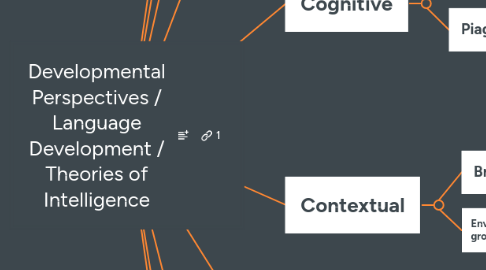
1. Social Constructivist
1.1. Vygotsky
1.1.1. Language becomes thoughts
1.1.2. MKO: More Knowledgeable Other
1.1.2.1. EMF: Elementary Mental Functions including Attention, Sensation, Perception, Memory
1.1.2.1.1. HMF: Higher Mental Function of Independence
1.1.3. ZPD: Zone Of Proximal Development
1.1.3.1. ZPD: Zone of Proximal Development where the most sensitive peart of instruction should be given
1.1.3.1.1. Social Interactions influence on higher learning and cognition
2. Behaviorist
2.1. Watson, Skinner
2.1.1. Operational Conditioning
2.1.1.1. Learned by use of positive reinforcement and punishment
2.2. Bandura
2.2.1. Social Cognitive Learning
2.2.1.1. Learns through modeling
2.3. Pavlov
2.3.1. Classical Conditioning
2.3.1.1. Learn through linking stimuli and anticipating events
3. Psychodynamic
3.1. Freud
3.1.1. Psychosexual Stages Of Development
3.1.2. ID: Pleasure seeking wants it now
3.1.3. Ego: Mediator between ID & Superego
3.1.4. Superego: Righteous wants to do the right thing
3.1.5. Unconscious vs. conscious
3.2. Erikson
3.2.1. Psychosocial Stages Of Development
4. Humanistic
4.1. Focuses on conscious and the potential for healthy personal growth through free will and self actualization
4.2. Rodgers
4.2.1. 3 Conditions For Growth Promoting Climate: Genuineness, acceptance, and empathy
4.2.2. Self-Concept : Answers the who am I?
4.2.3. Person - Centered Perspective
4.3. Maslow
4.3.1. Hierarchy of Needs
5. Cognitive
5.1. Neo-Piagetian
5.1.1. Information Processing
5.1.1.1. Input from environment, process it and output decisions
5.2. Piaget
5.2.1. Schema
5.2.1.1. Mental framework that helps us interpret information
5.2.2. Acommidation
5.2.2.1. How the mind comes to integrate new knowledge
5.2.3. Assimilation
5.2.3.1. Understanding concepts in the schemas we already know
5.2.4. Four Stages of Development
5.2.4.1. Sensory Stage, Preoperational, Concrete Operations, Formal Operational
6. Contextual
6.1. Bronfenbrenner
6.2. Environment affects how children grown and develop
6.2.1. Five levels : Macrosystem, Exosystem, Mesosystem, Microsystem, Chronosystem
7. Language Development
7.1. Nativist/Innatist
7.1.1. Chompsky
7.1.2. (LAD) Language Acquisition Device
7.1.2.1. Critical/ Sensitive period (Birth-9yrs)
7.2. Learning
7.2.1. Reinforcement
7.3. Social Interactionist Approach
7.3.1. Desire to connect and communicate with others drives learning language
7.3.1.1. Vygotsky
8. Theories of Intelligence
8.1. Triarchic Theory of Intellegence
8.1.1. Robert Sternburg
8.1.2. 3 independent intelligence
8.2. General Intelligence (g factor)
8.2.1. Charles Spearman
8.2.2. Abilities vary together ex: If you score high in math you may also score high in reading
8.3. Primary Mental Ability
8.3.1. L.L. Thurstone
8.3.2. 7 factor Theory
8.4. Multiple Intellegence
8.4.1. Howard Gardner
8.4.2. 7-9 Independent Intelligence
8.4.2.1. Includes more than book smarts
8.5. Successful Intelligence
8.5.1. Robert Sternburg
8.5.2. one’s ability to set and accomplish personally meaningful goals in one’s life, given one’s cultural context
8.5.3. creative, analytical, practical, and wisdom-based
